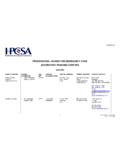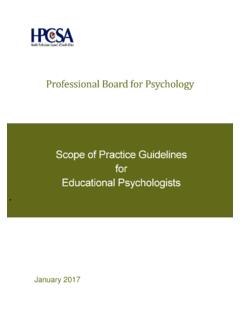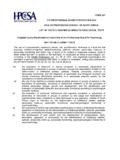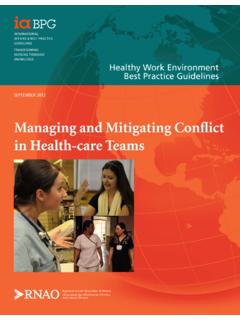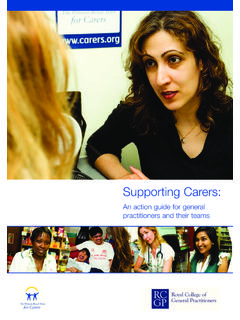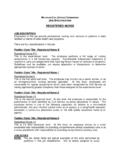Transcription of PROFESSIONAL BOARD FOR PSYCHOLOGY
1 FORM 258 HEALTH PROFESSIONS COUNCIL OF SA PROFESSIONAL BOARD FOR PSYCHOLOGY FRAMEWORK FOR EDUCATION, TRAINING, REGISTRATION AND SCOPE OF registered COUNSELLORS i TABLE OF CONTENTS GLOSSARY .. 1 RATIONALE FOR THE QUALIFICATION .. 2 PURPOSE OF THE QUALIFICATION .. 2 ROLE OF A registered COUNSELLOR .. 2 OPTIONS FOR OFFERING THE B PSYCH PROGRAMME .. 3 REQUIREMENT OF REGISTRATION AS STUDENTS .. 3 SELECTION CRITERIA .. 3 ACADEMIC TRAINING REQUIREMENTS .. 4 PROFESSIONAL TRAINING .. 4 RESEARCH PROJECT .. 5 PRACTICUM 5 SCOPE OF PRACTICE FOR registered COUNSELLORS .. 5 LIST OF PSYCHOMETRIC TESTS TO BE USED BY registered COUNSELLORS .. 6 SUPERVISION OF registered COUNSELLORS .. 7 TIMEFRAME FOR REGISTRATION AS registered COUNSELLORS .. 8 1 A FRAMEWORK FOR EDUCATION, TRAINING, REGISTRATION AND SCOPE OF registered COUNSELLORS GLOSSARY Community context - includes police and military services, schools, Early Child Development Centres, FET Colleges, correctional facilities, Employee Assistance Programmes, Primary Health Care Centres, District Hospitals, faith-based organizations etc.
2 Counselling - is a reflective, disciplined relationship between Counsellor and client(s), demanding, equal, receptive, supportive, helpful, genuine, based on trust, relationship with a view to uphold the rationale and purpose of registered Counsellor context. Crisis - a state of psychological turmoil in which the person concerned feels unable to cope. Crisis intervention - counselling that focuses on acute or critical situations ( victims or witnesses of crime or violence, accident victims, emergency emotional containment). Curative- counselling that helps to alleviate distress. Elementary understanding of psychopathology an understanding for identification and referral purposes. Prevention - a planned, proactive activity designed to prevent or reduce future harm. Primary intervention includes- Basic mental health care; Identifying and addressing the basic causes of problems, or containing it so that it does not get worse (secondary intervention); Activities designed to reduce l stressors and help develop peoples coping abilities.
3 ; Psychological counselling intervention Screen, assess, psychological education and training and referral. Screening the investigation of a possible disruption to a client s psychological wellbeing and early identification of mental health challenges. Supportive- counselling that assists by alleviating traumatic responses and/or assists clients to adjust to altered circumstances Systems level - the dynamic interaction between individuals, couples, families, groups, communities and society. 2 RATIONALE FOR THE QUALIFICATION The qualification is aimed at producing competent, ethical and PROFESSIONAL practitioners who will meet the needs of South Africa in order to make primary psychological services available in diverse settings thereby enhancing psychological well-being of the public. This qualification is critical in providing good quality psychological care at primary health care level.
4 Qualifying practitioners are able to provide a variety of psychological services at the primary health care level. The qualification is aligned to the National Framework for Human Resources for Health in South Africa and is responsive to the psychological needs and care of the South African population in diverse contexts. The focus of the profession is on prevention, promotion and community based care. PURPOSE OF THE QUALIFICATION The qualifying practitioner will be registered with the Health Professions Council of South Africa to render psychological services that are focused on prevention and primary intervention for psychological difficulties in diverse community context as well as promotion of psychosocial health, within the scope of practice for registered Counsellors which is defined according the Health Professions Act, 1974 (Act 56 of 1974) and subsequent amendments.
5 ROLE OF A registered COUNSELLOR The role of the registered Counsellor is to make psychological services accessible to the diverse South African population and to provide psychological and preventative interventions that focus on support and promote the enhancement of wellbeing in community contexts. This includes individuals, families, groups, communities and excludes psychotherapeutic intervention. registered Counsellors differ from other categories of PSYCHOLOGY in that their primary function is to prevent, promote, intervene, and appropriately refer. Their primary role at a preventative and promotional level involves screening and engaging early and appropriate levels of intervention Screening and identification of mental health challenges Containment of presenting difficulties Provide preventative, developmental counselling services and interventions Psycho-education and training Promotion of primary psychosocial well being Referral to appropriate professionals or other appropriate resources (know when to refer to a psychiatrist or psychologist) Working in a context appropriate, multi PROFESSIONAL team Assessments (intellectual assessment, BASIC functioning, kinetic figure drawing) 3 OPTIONS FOR OFFERING THE B PSYCH PROGRAMME Registration as a registered Counsellor is contingent on completion of.
6 An accredited 4 year B Psych or Honours degree in PSYCHOLOGY accredited by the BOARD as equivalent to the B Psych degree that incorporates an approved 6 month/ or 720 hour face-to-face practicum. Counselling hours must be recorded in a logbook and countersigned by the supervisor. REQUIREMENT OF REGISTRATION AS STUDENTS In terms of the Regulations relating to the registration of Student registered Counsellors published in terms of Government Notice No 287 of 9 October 2012, all students registered at an accredited institution offering education and training as registered Counsellors have to be registered as students as from the first year of study. In order to register as a Student registered Counsellor, Form 53 has to be completed by each student and verified by the educational institution.
7 The following supporting documentation must accompany the application: 1. The prescribed registration fee with proof of payment. 2. A copy of the identity document or birth certificate of the student. 3. A copy of the marriage certificate of the student (Should the student wish to register in his/ her married surname). An additional fee in respect of each month or part of a month will be payable should the application be submitted later than four months after the date of registration at the Training Educational Institution. The register for student registered Counsellors will be effective as from 2 January 2013. SELECTION CRITERIA Selection of students are be done by higher educational institutions according to institutional criteria. Examples of criteria should include but not limited to the following: ACADEMIC CRITERIA according to the university entrance regulations for undergraduate and post graduate qualifications.
8 SELECTION CRITERIA according to the accredited B Psych programme, eg Intra and interpersonal skills Potential to learn necessary skills of a registered Counsellor Ability to work in a team Psycho social wellness Ability to work under pressure 4 Ability to work in a community Ability to work with diversity Academic reading and writing RPL CRITERIA according to university procedures and regulations. ACADEMIC TRAINING REQUIREMENTS An academic Hons qualification at an NQF Level 8 as requirement Academic training includes the following: Psychopathology Developmental PSYCHOLOGY Therapeutic PSYCHOLOGY Research PSYCHOLOGY Psychometric and psychological assessment Personality PSYCHOLOGY PROFESSIONAL TRAINING PROFESSIONAL training includes but is not limited to the following: PROFESSIONAL ethics and conduct Interviewing techniques Client observation skills Basic counselling skills Development of preventative and developmental programmes Report writing Conceptualization skills, bio-psychosocial and systems theory as appropriate for community interventions Structured trauma counselling Community understanding and intervention Psychometric competencies (within their scope of practice) Cultural beliefs and diversity Language sensitivity Entrepreneurial skills 5 Psycho-educational skills A thorough grounding in the Ethical Code, the Bill of Rights and other relevant legislation.
9 RESEARCH PROJECT The research project of student/Intern registered Counsellors has to be conducted in a community setting. PRACTICUM TRAINING 1. A practicum for registered Counsellors forms part of a BOARD accredited B Psych programme; 2. The practicum training has a duration of 6 months full time or an equivalent of not more than 12 months part time; 3. The practicum may commence from the last semester of the third year; 4. This practicum may not be done in a private practice and not in a psychiatric setting; 5. The practicum should be formulated based on the model of training; 6. Practical training is being done during the duration of the four year training; 7. The practicum may not be extended beyond 3 months. SCOPE OF PRACTICE FOR registered COUNSELLORS registered Counsellors are psychological practitioners who perform psychological screening, basic assessment and technically limited psychological interventions with individuals and groups, aiming at enhancing personal functioning in a variety of contexts including education, work, sport, non-governmental organizations, Non Profit Organisations, DPO and community.
10 More specifically, the registered Counsellor will: Manage complete sub-elements of intervention programmes with associated interventions; Design sub-elements of intervention programmes and processes; Execute less advanced, more structured interventions. The following acts resort within the scope of practice of registered Counsellors: a. being the first line of community based psychological support; b. providing preventative and developmental counselling services; c. performing supportive psychological interventions to enhance emotional functioning and mental well-being; 6 d. performing basic psychological screening for the purpose of mental health as a preliminary screening tool in order to refer appropriately; e. developing preventative and developmental interventions on all systems levels; f. design, implement and monitor preventative and developmental programmes appropriate for all systems levels; g.


